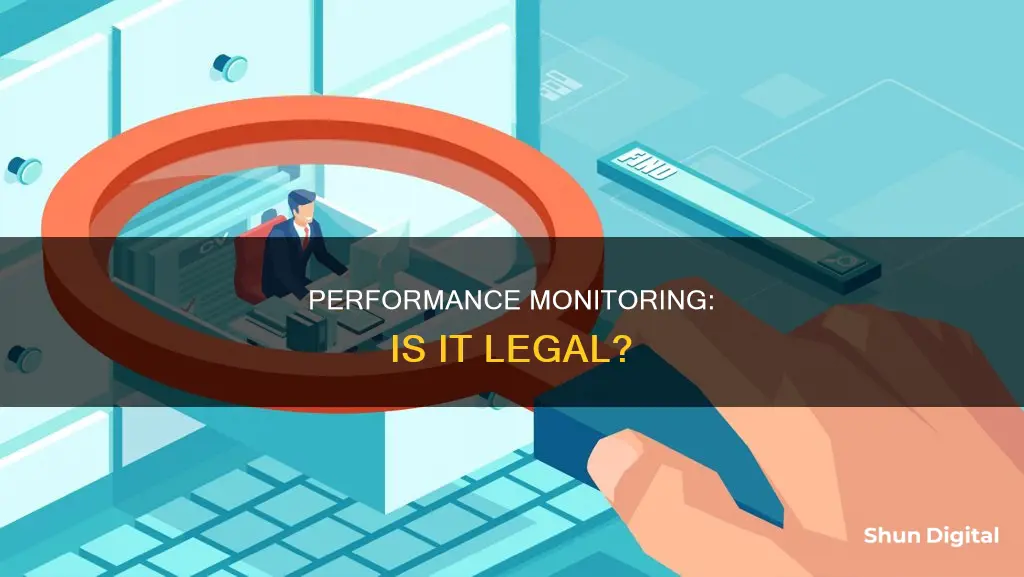
Employee monitoring is a controversial topic, with many grey areas regarding what is legal and what is not. It involves tracking staff members' whereabouts and activities, and companies use it to increase productivity and for safety purposes. While it is legal in most countries, including the US and Europe, there are certain ethical considerations and guidelines that must be followed to respect employee privacy.
In the US, federal legislation allows employers to monitor employees without their consent, but some states, including Connecticut, Delaware, Texas, and New York, require employers to inform employees about monitoring practices. On the other hand, European Union laws under the General Data Protection Regulation (GDPR) require employers to obtain explicit consent from employees or have a legitimate business reason for monitoring.
Regardless of the jurisdiction, employers must balance their monitoring activities with employees' privacy rights and ensure transparency in their policies and practices to build trust and avoid legal repercussions.
| Characteristics | Values |
|---|---|
| Legality | Employee monitoring is generally legal in the US and Europe, but there are some state-specific variations. |
| Notification | In some states, employers must inform employees about monitoring practices. |
| Consent | In some states, employers must obtain employee consent for monitoring. |
| Purpose | Monitoring must be for a legitimate business reason. |
| Devices | Monitoring is generally permitted on company-owned devices. |
| Work hours | Monitoring during breaks may require consent. |
| Privacy | Employers must respect employee privacy and avoid collecting excessive data. |
What You'll Learn

Is it illegal to monitor employee emails and private messages?
Monitoring employee emails and private messages is a complex issue that varies depending on the region and the specific circumstances. While it is not inherently illegal for employers to monitor these communications, there are important ethical and legal considerations to keep in mind.
In the United States, under the Electronic Communications Privacy Act of 1986 (ECPA), using a computer monitoring app is generally legal. However, certain states, including Connecticut, Delaware, Texas, and New York, require employers to inform employees about monitoring practices and obtain their consent. Additionally, monitoring must be done for legitimate business reasons and cannot infringe on employees' personal privacy. For example, monitoring personal devices may require a Bring Your Own Device (BYOD) policy in place.
In the European Union, under the General Data Protection Regulation (GDPR), employers must obtain explicit consent from employees or have a legitimate business reason for monitoring.
Other regions have their own laws; for instance, in Canada, employers need to inform employees about monitoring and obtain their consent.
Regardless of the region, it is important to respect employee privacy and build trust. Unethical monitoring can lead to legal challenges and damage the company's reputation. Therefore, it is crucial to have clear and transparent monitoring policies in place, obtain informed consent from employees, limit monitoring to business-related activities, and regularly review and update monitoring practices.
Cloud Usage Monitor: Understanding Cloud Consumption
You may want to see also

Is it illegal to monitor employee computer screens and keystrokes?
In the US, monitoring employees' computer screens and keystrokes is legal in most cases, especially if it's done using company-owned devices. However, there are certain limitations and ethical considerations to keep in mind.
Legal Considerations:
US federal laws, such as the Electronic Communications Privacy Act of 1986 (ECPA), allow employers to monitor employees' communications and computer activities as long as there is a legitimate business purpose. While there is no federal law requiring employers to inform employees about monitoring, some states, including Connecticut, Delaware, Texas, and New York, mandate notification and, in some cases, consent.
Ethical and Productivity Considerations:
While monitoring can help improve productivity and security, it can also create a culture of distrust and negatively impact employee morale, engagement, and happiness. A study by Harvard Business Review found that employees under constant surveillance feel less responsible for their conduct and are more likely to take unapproved breaks.
Best Practices for Ethical Employee Monitoring:
- Be transparent about monitoring policies and communicate them clearly to employees.
- Secure consent whenever possible, even if it's not legally required in your jurisdiction.
- Limit monitoring to business-related activities and avoid collecting excessive personal information.
- Offer employees access to their activity reports to encourage self-evaluation and improvement.
- Conduct regular reviews of monitoring practices to ensure compliance with privacy laws and respect for employee privacy.
In conclusion, while monitoring employees' computer screens and keystrokes may be legal in certain jurisdictions, it is essential to strike a balance between monitoring and respecting employee privacy to maintain a healthy and productive work environment.
Simple Ways to Measure Your Monitor's Dimensions
You may want to see also

Is consent required for employee monitoring?
The requirement for employee consent in monitoring depends on the location. In the US, consent is not always necessary for monitoring, but certain states, including Connecticut, Delaware, Texas, and New York, require employers to inform employees about monitoring practices. In the EU, consent is more often required under GDPR rules, or at least a clear, documented reason for monitoring. In other countries, monitoring without consent may be allowed under certain conditions.
While consent may not always be legally required, it is still a respectful approach that can help build trust with employees. It is recommended to establish a comprehensive company policy regarding employee monitoring to ensure clarity and transparency. This policy should be easily accessible to all employees and provide an overview of what is being monitored, how, and why.
In addition to consent, employers should also be aware of privacy laws and ensure that monitoring practices do not violate employee privacy rights.
Connecting Powered Monitor Speakers to an Amplifier: A Step-by-Step Guide
You may want to see also

What are the legal boundaries of monitoring employee social media activity?
The legal boundaries of monitoring employee social media activity vary across different countries and jurisdictions. Here is an overview of the key considerations and guidelines:
United States
In the US, there is no federal law prohibiting employers from monitoring employees' social media activity. However, certain states, such as California, Illinois, and New York, have enacted laws that protect employees' privacy and restrict employers' monitoring activities. For example, California and Illinois prohibit employers from requesting employees' social media login information, while Connecticut and Delaware require employers to inform employees about monitoring practices. Additionally, several states have passed laws that protect employees from being required to provide their social media usernames or passwords to their employers.
European Union
Under the General Data Protection Regulation (GDPR), employers in the EU must obtain explicit consent from employees or have a legitimate business reason for monitoring their social media activity. The right to privacy and data protection is taken seriously, and employers must ensure that any monitoring is proportional and respects employees' fundamental rights.
Germany
Systematic monitoring of employees' social media activity is generally not permitted in Germany, as it violates employees' fundamental right to informational self-determination. However, event-related viewing of individual posts may be allowed if the employer suspects a violation of contractual obligations or other legitimate interests.
United Kingdom
While systematic monitoring is not advised, employers may take disciplinary action against employees who post offensive or unlawful content on public social media channels, especially if it relates to their work duties or violates company policies. Employers should tread carefully, as employees' rights to protection against discrimination and freedom of speech must also be considered.
Canada
Canadian law restricts the monitoring of employees' social media activity and requires that employees be notified beforehand. Monitoring is generally considered reasonable if it is connected to the employee's work and may result in termination if it harms the employer's reputation, impacts the employee's ability to perform their duties, or affects the employer's ability to direct their workforce.
Brazil
Monitoring employees' social media activity is controversial in Brazil, and while there are no specific regulations, employers must follow general rules of labour and privacy law. Monitoring is permitted for corporate or professional information but generally not for personal data and opinions.
In conclusion, the legal boundaries of monitoring employee social media activity vary depending on the country and specific circumstances. Employers should always seek legal advice and ensure that any monitoring is carried out ethically and with respect for employees' privacy and rights.
Finding Speakers in Monitors: Uncovering Audio Secrets
You may want to see also

What are the consequences of unethical monitoring?
Unethical monitoring can have several negative consequences for a business. Firstly, it can lead to a decline in employee productivity and engagement. Employees may feel anxious and stressed about being constantly watched, leading to decreased morale and motivation. This can further result in a toxic work environment, negatively impacting employee retention and the company's reputation.
Secondly, unethical monitoring practices can result in legal challenges and financial repercussions. Violating employee privacy and data security laws may lead to lawsuits and fines, as seen in the case of Amazon in France, where they were fined €32 million for excessive employee monitoring.
Additionally, unethical monitoring can damage the relationship between employees and management, leading to a breakdown of trust and a decline in loyalty and commitment from employees. This can create a hostile work environment and negatively impact diversity and inclusion efforts within the organization.
Therefore, it is crucial for organizations to adopt ethical monitoring practices that respect employee privacy and well-being while also achieving the desired business objectives.
Monitoring Globe Broadband Usage: A Step-by-Step Guide
You may want to see also
Frequently asked questions
No, performance monitoring is not illegal. In the US, the Electronic Communications Privacy Act of 1986 (ECPA) allows employers to monitor their employees' activities as long as there is a legitimate business reason for doing so. However, certain states, such as Connecticut, Delaware, Texas, and New York, require employers to inform employees about monitoring practices.
Performance monitoring can help to enhance security, increase productivity, and mitigate legal and compliance risks. For example, video surveillance can deter employee theft, and monitoring employee communications can help to ensure compliance with regulations and prevent harassment.
Performance monitoring can create a sense of distrust among employees and negatively impact morale and productivity. It is important to respect employee privacy and only collect data necessary for legitimate business purposes.







